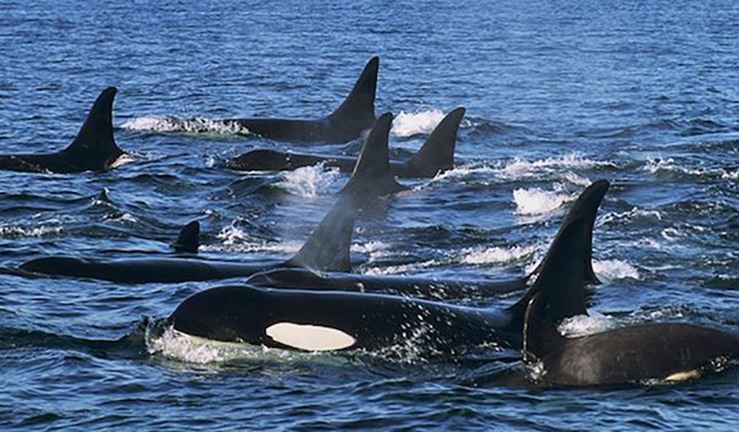RYA Orca Guidelines

Reports of intentional collisions by Orcas (Killer Whales) with recreational craft have taken place during the summer months since 2020 along the Spanish and Portuguese coasts. Orcas are a protected species under International, EU, Spanish and Portuguese law and as such it is illegal to take any action which may harm or disturb these marine mammals.
As wild animals, it is not possible for the RYA to provide advice that will fully mitigate the risks associated with Orca encounters. This is just one of the many risk factors that skippers must consider when planning passages, as they may affect your chosen route, safety protocols, time of departure or even the need for a particular journey.
Areas and times of concern
May to mid-August - approaches to the Straits of Gibraltar and the Gulf of Cadiz
Mid-August to October - from Cape Trafalgar to Gallica and Cape Finisterre
Although frequency of incidents may change between areas during the spring and late summer there is still potential for incidents to occur anywhere along the western Iberian coast and either side of the Straits of Gibraltar. Since 2022, interactions outside of these periods have also been recorded, though at lower frequencies, and some have taken place in the Bay of Biscay.
Characteristics of incidents
Typically, the incidents involve Orcas bumping and spinning boats for a prolonged period of between 45 and 90 minutes. Often this activity is accompanied by whales shaking and damaging rudders. Some incidents have resulted in significant damage and, in rare cases, the damage to the rudder and shaft have resulted in the loss of the boat. The reason for this behaviour has not been determined.
Guidance
As the skipper of a craft, you have the responsibility for the safety of your crew, protecting your vessel and adhering to wildlife protection legislation. You should consider carefully how to balance all these responsibilities before placing yourself, your craft and crew at risk.
If you find yourself in a situation where Orcas are near your boat, then follow the RYA advice to maintain safety whilst helping to prevent distress to the Orcas and damage to your craft.
Prior to departure:
Research the latest information on interactions and recommended mitigations, and decide if this influences your route, time of departure or safety protocols on board. Some useful links are provided below.
- Verify with your insurer that you have appropriate cover for wildlife damage and emergency towage.
- Consider your responsibilities for crew safety and legal obligations for protected species.
- Undertake passage planning to avoid times and places of high risk. Do you need to risk entering an area where Orca incidents have occurred?
- Ensure that you are carrying spares for the repair of steering mechanisms and understand how to undertake such repairs.
- Carry an emergency tiller and practice its fitting and use before departure.
- Practice steering your boat under sail without using the tiller, so you are confident about its characteristics should the rudder be damaged or lost.
- Check all on-board safety equipment including personal gear and methods for plugging holes in the hull.
- For up-to-date information on orca interactions to inform your voyage planning, visit the GTOA site.
When approaching an area where there have been orca incidents:
- Maintain a radio watch for information
- Keep a good look-out, particularly aft, for whales breaching or blowing
- Keep your distance and maintain a wide berth from any whales seen
- Take normal precautions and ensure lifejackets are worn and safety equipment is close at hand
If whales are spotted nearby (within 500m) or approach the craft:
- Turn off engine and echo sounder
- Disengage autopilot
- Minimise any noise (don’t shout)
- Be prepared to let go the wheel / helm to avoid injury
If your vessel is struck by a whale:
- Keep noise and light to a minimum
- Sit down to avoid being knocked from your feet and injuring yourself
- Notify maritime authorities (see Local Safety Protocol), and
- Remain calm and sit tight
Various online resources, and some officials in Portugal, have stated that slow reversing could reduce the duration of encounters, but the data collected to date does not provide a statistical or scientific validation of the effectiveness of such action. This action would still be considered illegal in some states’ coastal waters.
The Local Safety Protocol, supplements guidance provided by the RYA for sailors departing the UK, can be found on Orca Iberia’s Atlantic Orca Working Group (GTOA) website where they provide further information on interactions, navigation restrictions, the latest science, and other background information.
Reporting an incident or non-incident
The Cruising Association and the Atlantic Orca Working Group are collating information on both incidents and uneventful passages through the area inhabited by the Orcas. To learn more about this initiative, review previous reports, or to report your own experiences, visit the Cruising Association website.
